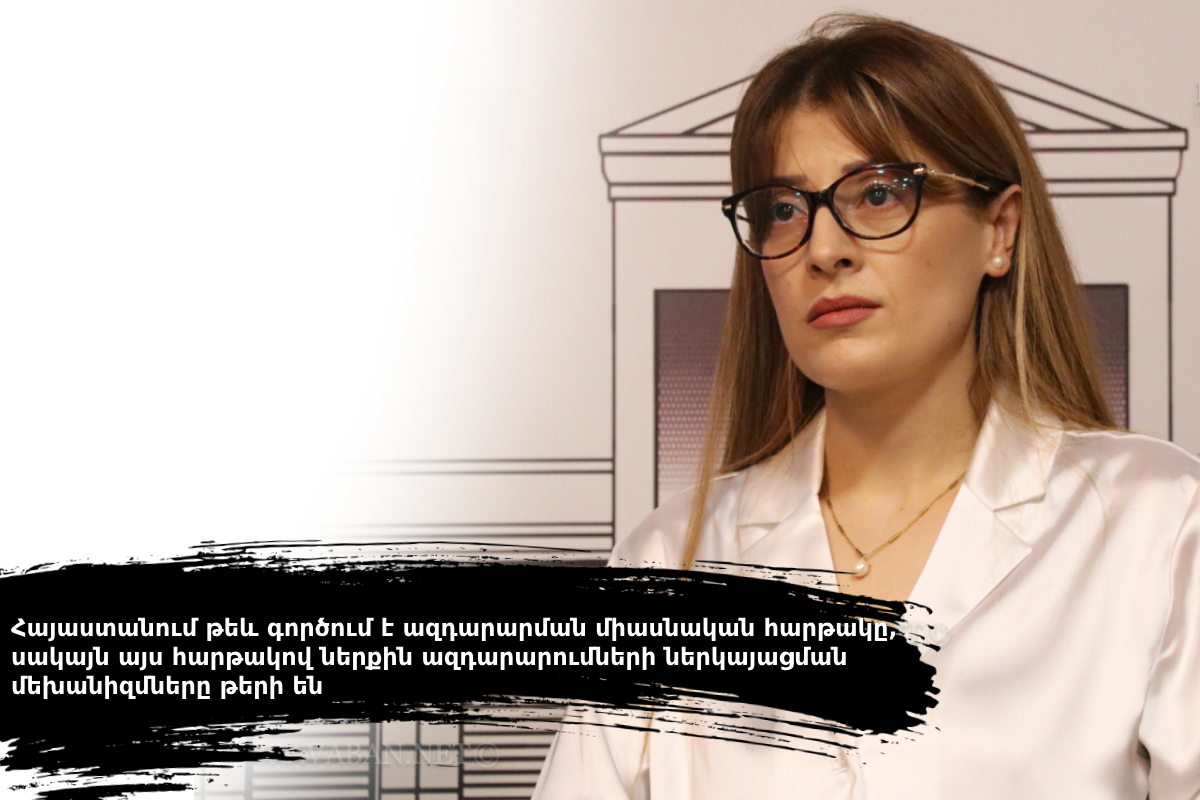Although there is a Unified Platform for Whistleblowing in Armenia, yet the Internal Whistleblowing Mechanisms are incomplete: Syuzanna Soghomonyan

According to the Law "On the System of Whistleblowing” there are 3 types of whistleblowing: internal whistleblowing, external whistleblowing and whistleblowing to public.
Submission of a report to immediate supervisor or superior, or another person exercising supervision r, or the person authorized by the head of the competent authority is internal whistleblowing. Submission of a report to the competent authority is external whistleblowing.
Publications in the mass media of an incident of a corrupt nature or a conflict of interest or a violation of a code of conduct or incompatibility requirements or other restrictions or declarations, which, according to the Criminal Procedure Code of the Republic of Armenia and the Law "On the Prevention of Corruption Commission", may be a reason or a basis for initiating appropriate proceedings..
In an interview with Iravaban.net, Anti-Corruption Expert Ms Syuzanna Soghomonyan stated that the law provides for the types of internal and external whistleblowing. However, it does not directly provide which type of reporting (internal or external) the whistleblower can choose to present.
She mentioned that as a result of the analyzes made regarding the types of whistleblowing, a number of conclusions were drawn and presented to the Ministry of Justice in the form of recommendations.
According to the standards of the Anti-Corruption Network for Eastern Europe and Central Asia (ACN) of the Organization for Economic Cooperation and Development (OECD), European Union as well as international experience, in the case of internal and external whistleblowing, the contact information of the department or the persons responsible for internal and external whistleblowing is presented in specially separated sections on the websites of the competent authorities. The information includes: e-mail and postal addresses, telephone numbers indicating whether telephone conversations are recorded, procedures for recording reports, including how and what type of information the authority may request from the person making the report, including the need to provide clarifications and additional information regarding the information, the period, method and content of providing feedback, as well as information where the provision is clearly formulated, according to which the persons who submitted a report in the event of a breach of confidentiality are exempted from liability.
"Although there is information on the websites of competent authorities in Armenia, in many cases they are incomplete (not all of them have complete contact information, including there is no mention of recording phone conversations, information about whistleblowers is not in a visible place), and the clarifications and information are actually quotes from the law, and not accessibly explained.
The Law "On the System of Whistleblowing” provides for the possibility of filing internal whistleblowing. Despite this, there is no direct (immediate) obligation to introduce internal whistleblowing procedures for public (state) sector structures as such. The law directs the whistleblower to submit the report to his or her immediate supervisor or his or her superior, or another person exercising supervision over him or her, or the person authorized by the head of the competent authority. In turn, the decision of the RA Government No. 272 of 15.03.2018 established a requirement to appoint persons responsible for recording and formulating internal whistleblowing reports and to inform employees about them, which according to international standards is not the same as whistleblowing procedures (channels), for example: the creation of a special telephone line, e-mail or web-form created for the purpose of submitting internal whistleblowing reports", Syuzanna Soghomyan explains.
The Expert notes that at the same time, the aforementioned decision of the Government defines the procedure for recording and formulating whistleblowers' reports when they are received by the persons responsible for whistleblowing. Meanwhile, there is no regulation for the cases when the reports are presented to the direct manager or his superior or another person exercising control over him.
In accordance with OECD and EU standards and international practice, internal whistleblowing procedures should allow for whistleblowing in writing, orally or both. In the case of oral reporting, it should be possible to carry it out by telephone or other voice messaging systems, as well as at the request of the person presenting the report, through a physical meeting within a reasonable period of time. There are countries where a unified electronic platform for whistleblowing has been implemented to ensure whistleblowing, which is accessible to competent authorities that record and investigate whistleblowing, according to appropriate restrictions.
"Only the method of presenting written or oral reports is provided in Armenia. Any other method, including telephone, voice communication or existing meetings is not provided. Moreover, although the unified electronic platform for whistleblowing operates in Armenia, there is no mechanism for submitting internal whistleblowing through this platform," the specialist noted.
According to OECD and EU standards and international experience, in the case of internal whistleblowing, the opportunity to provide advice to the whistleblowers is provided by the competent authorities or responsible persons who received the report. HRD provides confidential counseling and legal support in Armenia.
Citizens can openly and anonymously report corruption and other cases on Haytnir.am online whistleblowing platform. Submitting an application is free.
Please note that this publication was prepared within the framework of the program “Multifaceted Whistle-Blowing Promotion in Armenia”, implemented by the “Armenian Lawyers Association” (ALA) NGO with the support of the Open Government Partnership (OGP), funded by the European Union (EU) within the framework of the “EU for Good, Eastern Partnership” project.
This publication expresses the position of the author, the ALA, which does not necessarily coincide with the position of the OGP and the EU.